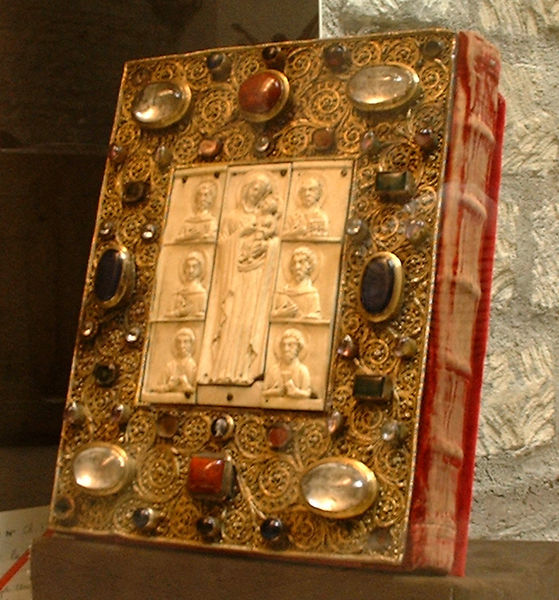Reading Lists for Graduate Students
This link will take you to the MA Reading List for graduate students of Spanish Literature prepared and maintained by the Department of Spanish & Portuguese at UW-Madison. Any questions about these lists should be directed to them.
General Reference Books & Resources
-
Figuring the Feminine by Figuring the Feminine argues that the bodies of women are crucial to the working out of such questions as the unsettling shift from orality to literacy, textual instability, cultural dissonance, and the resistance to cultural and religious hegemony.
Call Number: eBookISBN: 9781442688100Publication Date: 2016-01-29 -
 Historia critica de la literatura española.
by
Call Number: PQ 6032 .A5 1969 (Vols 1-7)Publication Date: 1969
Historia critica de la literatura española.
by
Call Number: PQ 6032 .A5 1969 (Vols 1-7)Publication Date: 1969 -
 Iconography in Medieval Spanish Literature
by
Call Number: PQ 6141 .K44 1984ISBN: 9780813114491Publication Date: 1984-07-01
Iconography in Medieval Spanish Literature
by
Call Number: PQ 6141 .K44 1984ISBN: 9780813114491Publication Date: 1984-07-01 -
Inscribing the Environment by Ecocriticism as a theoretical model has primarily been used in the study of Romantic, post-Romantic, and contemporary literary texts. Applications of the concepts to medieval literature, however, are a fairly recent phenomenon. This book examines key, canonical works from medieval Spain, showing how descriptions of the natural world in these texts are informed by both the authors' perceptions of the environment and established literary models.
Call Number: eBookISBN: 9783110309393Publication Date: 2013-03-15 -
 Introducción a la literatura medieval española
by
Call Number: PQ 6058 .L6 1966Publication Date: 1966
Introducción a la literatura medieval española
by
Call Number: PQ 6058 .L6 1966Publication Date: 1966 -
Marginal Voices by This collection of essays reveals the diversity of the impact on late medieval and Golden Age Spanish literature of the socio-religious dichotomy that came to exist between conversos (New Christians), who were perceived as inferior because of their Jewish descent, and Old Christians, who asserted the superiority of their pure Christian lineage.
Call Number: eBookISBN: 9789004222588Publication Date: 2012-02-03 -
Medieval Iberia by As the first comprehensive reference to the vital world of medieval Spain, this unique volume focuses on the Iberian kingdoms from the fall of the Roman Empire to the aftermath of the Reconquista. The nearly 1,000 signed A-Z entries, written by renowned specialists in the field, encompass topics of key relevance to medieval Iberia, including people, events, works, and institutions, as well as interdisciplinary coverage of literature, language, history, arts, folklore, religion, and science. Also providing in-depth discussions of the rich contributions of Muslim and Jewish cultures, and offering useful insights into their interactions with Catholic Spain, this comprehensive work is an invaluable tool for students, scholars, and general readers alike. For a full list of entries and contributors, a generous selection of sample entries, and more, visit the Medieval Iberia: An Encyclopedia website.
Call Number: eBookISBN: 9781136771620Publication Date: 2002-12-30 -
 Towards a History of Literary Composition in Medieval Spain
by
Call Number: PQ 6058 .N46 1986ISBN: 9780802025708Publication Date: 1986-01-01
Towards a History of Literary Composition in Medieval Spain
by
Call Number: PQ 6058 .N46 1986ISBN: 9780802025708Publication Date: 1986-01-01 -
Women in the Medieval Spanish Epic and Lyric Traditions by The culture of medieval Spain was anything nut homogeneous. It varied not only through time, with the approach of the Renaissance, but also geographically, with great differences between north and south. In this study, author Lucy A. Sponsler illuminates the role of women during this interesting period by exploring their portrayal in literature. Women in the Medieval Spanish Epic and Lyric Traditions examines the various ways in which women were portrayed in the formative years of medieval society, as well as the development of these views as new social mores evolved. Employing a thorough examination of the literature, Sponsler reveals that a high degree of respect was demonstrated toward women in Spanish prose and poetry of this period. Her study sheds new light on the role of women in relation to men, family, and social organization in medieval Spain.
Call Number: PQ 6098.W64 S6ISBN: 9780813154688Publication Date: 1975

